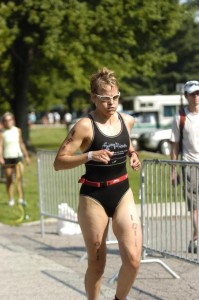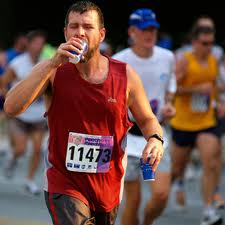
First week, we identified some issue with dehydration. My client switched half way on the bike from his usual drink to Gatorade because it is convenient. One problem is that regular Gatorade will not be on the course. Second, the muscle cramping, slight nausea, fatigue and high heart rate are a result of dehydration. Switching products actually aided in his dehydration. As you may recall from the last blog post, he also suffered a bit of low blood sugar issues with the dehydration.
Second week, the muscle cramps were gone! But we still had some fatigue on the run getting off the bike. Reviewing intake of fluids, etc, the calories were about right, the variety was about right, no switching midway to Gatorade, so hydration should have been ok….but he started hydrating too late, and felt behind the 8 ball after the second hour. Then it became a game of catch up to replenish fluids and not dehydrate. Now fluids were almost double of what they should be! And double the amount from the week before. We adjust electrolytes during the week so we reload electrolytes during the week, pre-load extra electrolytes Friday, so when the Saturday’s long 8-9 hour brick arrives, they are hydrated going into the workout. And start drinking their electrolyte drink earlier into the ride.
Sports nutrition and hydration are each a personalized process. It is NOT the same for each person. This is why I work with clients individually – to help each of them with their specific nutrition plan! It is not about me saying which product to use, but how to optimize the products and foods the client is already using. Then offer alternatives if those are not working.
Third week, hydration was spot on! Fluids were a bottle every 50 minutes. Electrolyte capsules on the hour, and varying gel with shot blocks every hour for added energy. Now the long brick Saturday was almost perfect! No muscle cramps, no fatigue, no nausea, no high heart rate and no heavy legs or disorientation. All signs of dehydration. But Sundays run was miserable – no energy, blah, diarrhea evening before and just unable to push thru. Based on this information, now we need to focus on the recovery meals and re-hydrating after Saturday’s long training session! 
Next week i will find out what worked and what did not with our next suggested change – reloading electrolytes after the long bike/run session to have a strong run the next day. I love when it works from week to week to week and the client notices the differences, too! Hydration is not always a quick fix, but a series of progressions. Hydration is a process of identifying the signs of dehydration, identifying where they started. It is about learning how to practice preventive sports nutrition to avoid dehydration symptoms, but also learning what can be used to alleviate the symptoms if they do happen.
With this client, each week we have identified a few more issues, and alleviated the ones from the week before. We are making progress and the client (and his nutrition coach) are happy with the progression. What started as a miserable finish off the bike into the run brick, is now an easy session. We learn from each week, and will optimize this 2 more times before race day. Once before the half Ironman (70.3), and once after so that the full Ironman will have no questions as to how to fuel and hydrate.
Hydrating is a process. We just help you identify what the dehydration issues are, and how to resolve them quickly. You can keep guessing, but why waste valuable time and energy. If you are ready to take your racing to the next level, without losing energy, having GI issues, nasuea, etc, please contact Joanna at 215-272-6774 to set up your Race Day Nutrition package.
Joanna Chodorowska, BA, NC, TPTH is a sport nutrition coach working with athletes to help them use real foods to perform at their best. She is an elite athlete who has experience most of the same issues she helps clients resolve. She understands the needs of an athlete. She’s been there.